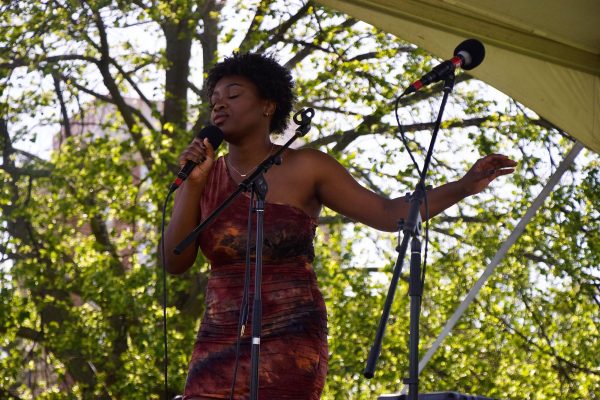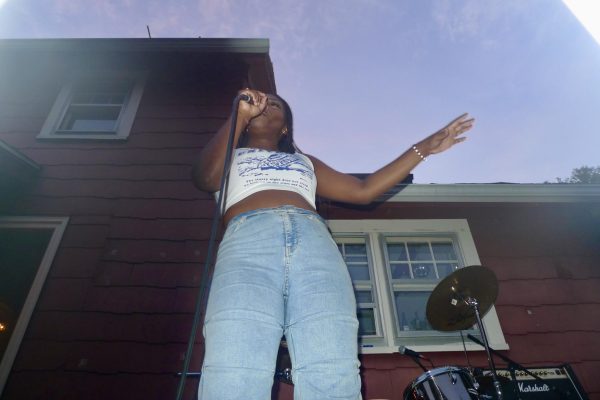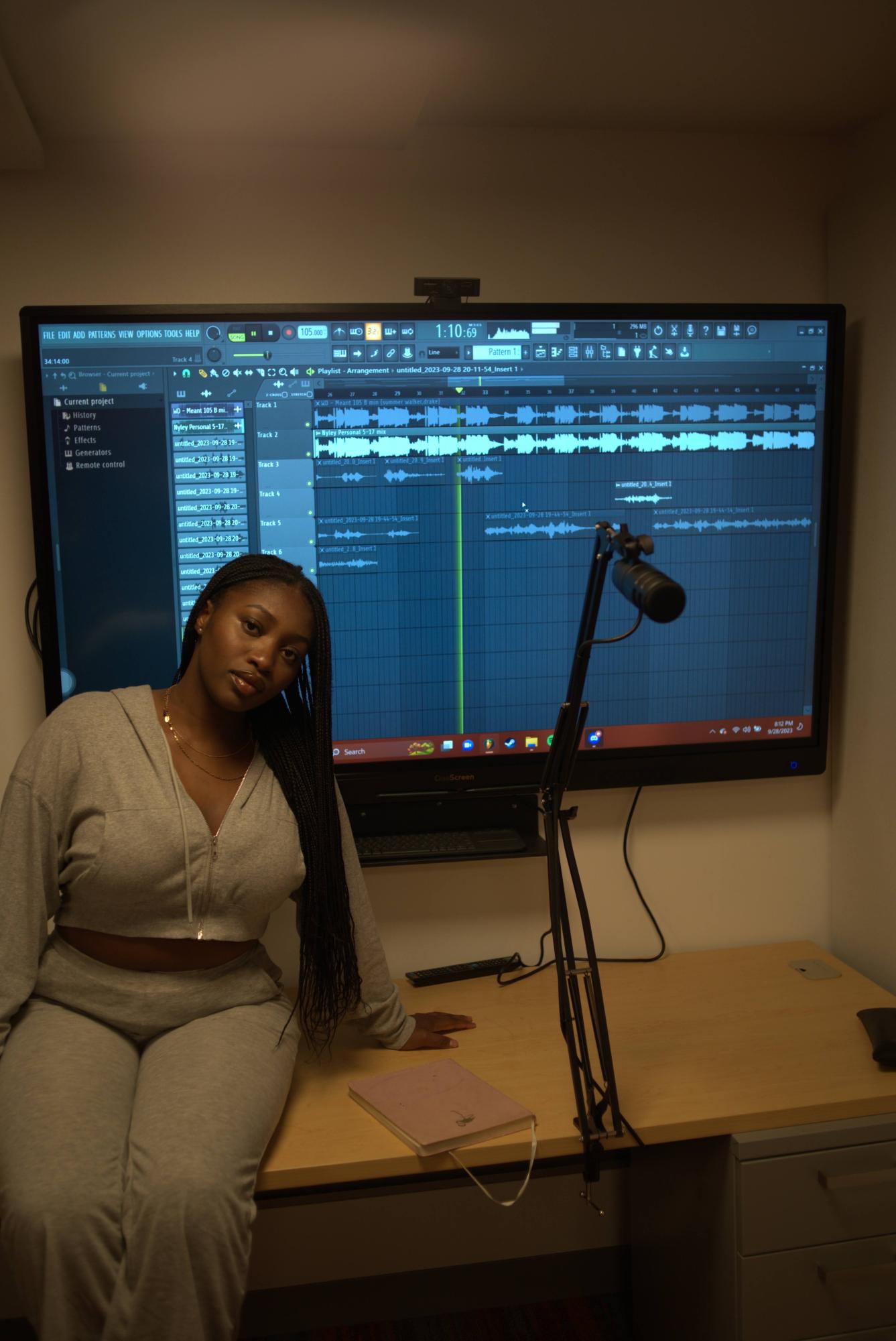When Nyley Moise was nine years old, she was already certain about her destiny. The outspoken and forthcoming Haitian American child from Saugus, Mass. one day sat down and essentially penned a manifesto – one that’s decidedly well-written for an elementary-schooler – detailing in great length her life’s purpose.
One might chalk up that imaginative stream-of-consciousness, shimmering rainbows-and-sunshine diary entry to just an average naive child with big dreams. But not every kid writes a page-long script about wanting to be a firefighter or a ballerina or the president of the United States. Moise, since the very beginning, knew she was born to be a musician.
Impressively articulate, Moise learned how to read and write by age three, and quickly learned to understand the power of language. Her letter of declaration, written in one of the several blue or pink “music books” she fervently kept as a creative kid, not-so-subtly hints at this innate strength.
The 9-year-old Moise truly felt the weight of words.
“I just remember saying just how God destined me to make music. ‘This is my destiny. This is a dream that would come true. This is one of the main reasons why I’m here,’ to kind of explore this and to work on this passion of that and add something central to who I am,” she said, listing the phrases she conjured in her proclamation. “And that’s a gift from God.”
When looking back on old childhood dreams, it’s easy to delegitimize them. But Moise, now a senior finance major and economics minor pursuing a certificate in civic service learning and civic engagement, today released her debut album, “Nothing Left Unsaid.”
In class, Moise sits relaxed, slightly slumped in her chair, her wavy dark hair falling upon her shoulders. She looks intently at the board, seemingly one of the only students paying genuine attention to the professor’s lectures. She usually raises a hand when posed a question, and answers in a soft spoken thoughtfulness. But a few weeks ago, when Moise casually announced she’s dropping her full-length album in May, the many eyes of her peers quickly drew up from their laptops, ladened with online shopping tabs and Wordle attempts.
Her discography on Spotify currently accumulates to six singles, which nearly tripled upon the LP’s release. Each track, despite her small body of work spanning six years, cohesively formulates a sweet sound dripped in spicy tang. The production quality is impressive for the campus recording booths, and Moise’s croons float like feathers falling from the aftermath of a pillow fight.
While Moise says her current R&B sound is still in an evolving phase, she’s ready to incorporate the elements central to her identity, like her faith. “I kind of want those to intertwine even more, which is why I feel like with this album especially, it does feel kind of the end of an era because I want to find a way to kind of intersect that more,” she said.
“…And I think that’s kind of more of a direction I want to go into in my own unique way and incorporate my culture as well as a Haitian girl, and just bring all those aspects together to really represent me.”
In her latest single, “Hopeful,” featuring GEØ, she glides between ambient synthesizers and vibrating bass drops in a hypnotic vocal spell. Effortlessly tracing up through her higher register, the slightest vibrato – eased yet controlled, and purposefully so – colors the chorus in subtle flavor.
But last year’s “Personal” is asserted in self-empowerment and post-breakup revenge. Moise’s commanding delivery makes way for quippy add-ins about channeling the energy of the ethereally feminine R&B artist and spiritual Jhene Aiko, and more obviously cheeky gibes towards those closely watching, like the closing line, “No matter what you all think of me / I love what I think of me.”
Appreciating the works of other artists seems to have molded itself as a vital component to her own ethos as a musician. Her cousin, a frequented visitor, could find a small Moise sitting in front of the television as she watched countless Music Choice music videos, entranced in wonderment. A music book in one hand and the TV remote in the other, the rewind button bowed tirelessly in obeying Moise’s everlasting pursuit to write every single lyric down on paper, word for word, so she could learn the songs. Her cousin sat disgruntled, but he just didn’t understand the grind.
The music books were filled not only with Katy Perry, Kelly Clarkson and Taylor Swift hits, poems and other writing assortments, but originals about lollipops and a lost-love in the “Diary of a Wimpy Kid” girl-adjacent book series, “Dork Diaries.”
“Actually, I would make that a full song,” she said in the Isenburg hub, reflecting back on the hundreds of songs she penned as a child.

She took her talents to the studio after her uncle, well-connected with a producer, invested some time and money into getting Moise into the booth. Like her uncle, those in the studio were equally as impressed by her talent. The act of creating a song, start to finish, invigorated itself as a learning experience. This palpable magic hinted at something special; the day evoked deeper meaning for Moise, like all the phrases in her singing manifesto came alive.
“His belief in me also really kind of sparked a lot of my belief in myself,” she said. “But I’ve always had this kind of unwavering conviction that I was sure that this was something I was supposed to do, even if logistically, it didn’t seem to make the most sense.”
In Amherst, Moise performed at The Drake’s open mic nights in 2022, chasing any opportunity to perform at an event – a risk the musician is keenly aware of. Moise noted the R&B genre, at least contemporarily, is more attractive to listeners when kicking back late at night in your room. “Live performances isn’t really kind of the main selling point of R&B, whereas other kinds are more like dancing music and things like that, has more of that pull.”
But people liked Moise’s material – something she initially felt surprised her. Now, the artist blossomed in her UMass community, citing the many opportunities the space opened for her. Of course, the process was not easy by any means. As one of the very few Black women artists on campus, Moise had to forge a path forward for herself at UMass in pursuing music. But today, instead of mostly roughing the tiresome audition process, people now come to her.
Moise was asked to perform at the past two annual UMass Fashion Organization’s runway shows, this year’s annual Haitian American Student Association Peach Pageant, the on-campus Let’s Be Friends Fest, Big Red Bash, a gallery show and more.
“As soon as I was able to get my foot in the door, I was definitely able to pry it open a bit better and then have the tables kind of turned when people ask me to perform a bit more,” she said.

The recording process of “Nothing Left Unsaid” kicked off last April, with the oldest tracks written at age 15. The singer has spent countless hours in the studio with her producer, called “wholesome dave” – sometimes recording deep into the night, with the latest until 5 a.m. The 11-track LP is infused with themes of dark femininity, self-empowerment, and vulnerability and openness. “Just showing that those two themes can coexist is a big part of the album,” Moise said.
It was Moise’s goal to break the fourth wall she’s so observantly interacted with throughout her life: humans are taught to hide their tears when we’re sad, say one thing when we mean another, share a certain look when we want to assert a pointed glance.
“This is a big collection of all that period of my life when I was really kind of trying to play the game,” she said. “All those things I kinda didn’t say so I feel like now that I’ve said these things, there’s nothing left to say.”
The finance major isn’t particularly concerned with whether or not the project will be well-received, because she knows it’s good. “Doesn’t matter where you’re from, what people think about you or your culture, your people, what you look like, your gender,” she said. “If the numbers add up, the numbers add up, if the song is good, the song is good. Nobody can tell me anything.”
In preparation of the release, Moise held an album listening party at the Malcolm X Cultural Center last week. She cited it as the largest growth in her lifetime thus far, the dream she put to paper when she was nine years old.
But, for once, Moise’s words failed her. In an Instagram post after the album party, Moise – always the little girl who understood the power of words under the weight of her pen – said, “Words truly won’t even do it justice.”
Nyley’s “Nothing Left Unsaid” is now available for streaming.
Caitlin Reardon can be reached at [email protected]. Follow her on X @caitlinjreardon.




















